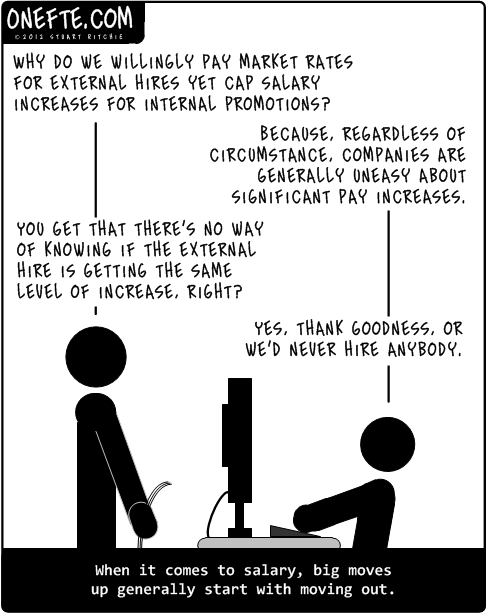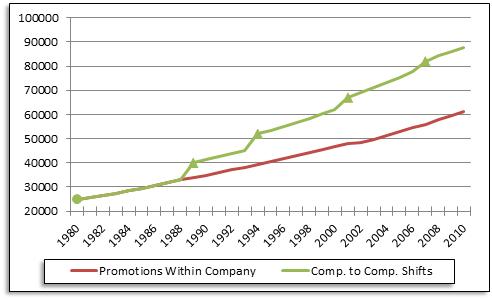Should You Leave Your Job to Increase Your Salary?

If there is one thing that is true of most companies, it’s that they are frugal to a fault. Their books are organized in some bizarre way that only members of secret accountant societies can interpret, utilizing mystic prayers and blood rituals. This is why a company will spend millions of dollars on a new lobby two weeks before they lay off thirty workers. I even have a friend who was promoted from one department to another, just to be laid off two months afterwards. Meanwhile, as he was being let go, the previous department that he left was hiring on new workers and buying new supplies. Money comes and money goes but which way, nobody knows. Who makes the decisions are known only by those entrenched in a corporate tower somewhere ten states away.
So it’s safe to say that when it comes time to arguing salary, you’re left with no room to argue salary. I mean, you can, but your manager isn’t the guy making fiscal decisions so he or she can only tell you so much. The decisions on what you will get are, again, made elsewhere. From this complete disconnect, each year a merit increase is given to all associates with a generic percentage established across the board (give or take a few percentage points based on actual merit.) Typically raises, or merit increases, are annual and barely (if even) outpace the cost of living which means they aren’t even raises at all. After working at a company or within a department for five or six years, you may be making $8,000 more annually but you’re also paying $7,800 more on gas and groceries, too.
Obviously complacency is not going to bring in an appreciable bump in income. The only way to bounce higher when staying with a company is via promotion which, in and of itself, is never a given, nor necessarily fair or based on good judgment. Just ask every scorned worker in the history of America’s industrial age – they’ll tell you an unbiased tale.
Or, again, you can try to ask for that raise. Be warned, though, your conversation might go something like this:
Promotions
Promotions will break up the steady pace of the annual merit increase but even then, the company already has you hooked. You are an employee and they know your current salary and what you have previously accepted. Oh, yeah, they also know that you are unlikely to argue the offered salary because you are already comfortable with the work environment and associated lifestyle. From my personal experiences, and those of professional colleagues, promotional raises are typically a three to five percent increase, assuming you aren’t making an insane leap like from janitorial supervisor to company Vice President.
Increasing your income through promotion isn’t bad, but it also isn’t great. An added caveat is that companies like to promote in a way that avoids having to dole out the annual merit increase to the promoted individual. This means, in a sense, you are only outpacing the world around you by two percent compared to what you would have without changing positions. The added workload and fresh responsibilities might not be worth such a minimal increase.
Now, if you’re positioning yourself for great things within your company and know you’ll be managing a division in no time, keep at it. I’ve only seen one or two success stories, myself, but that’s not to say they do not occur. One will notice though, that even if they achieve promotable status and get that glorious new cubicle next to the microwave, things might not add up. Joe Nobody in the cubicle next door might have been recently hired in from a completely unrelated company yet is making ten thousand more than you. Sure, he is a smart guy but he doesn’t know the in’s and out’s like you do.

Then there is Charlie Whoever who might be the most ignorant human being you’ve ever met but after being hired aboard two weeks earlier, makes twelve thousand more than you. What qualified him to make so much money? Who hired him? Why did he get the desk with the power strip?
Salary Ranges
Companies generally do not have a fixed salary in place for the position. There is a range of salaries that the company is willing to offer to the individual, usually dictated by physical location of the job, comparable position salaries, and the related job sector. What most people tend to not realize, and it isn’t a secret by any means, is that employees are not necessarily paid at fair market value. That is one reason why, in job interviews, you are asked about your expected salary. Companies do not like to offer a number because they are gambling as much as you. If they give out a number that is dead center in their acceptable range and you agree to it, they have saved themselves the headache of paying you top dollar, but they also have you placed higher than you might have suggested.
On the other end of the spectrum, for whatever reason, human beings undervalue themselves and are afraid of hurting the feelings of the Human Resources Director (an interesting point of which HR Managers are well aware.) They will look in the mirror and say “I’m not worth seventy thousand dollars” and then value themselves at some horrifically low number that is indicative only of their self-loathing and not of their actual work ethic (which is probably adequate, if not exceptional.) This is nonsense. If Jennifer Lopez’ rear end is worth millions then what are you compared to a piece of fat and flesh? If people would realize that value is not only subjective but also arbitrary, they’d have an easier time understanding how to live without regrets. Why is Charlie Whoever making twelve thousand more than you, despite his stupidity? Because there is no fair value for an individual beyond what they set for themselves, so long as it is within the range the company is willing to offer.
To give you an idea of how grossly wide open these salary ranges are, I once saw an internal document from a friend’s company which defined a specific salary level as anywhere between 40 to 70 thousand dollars. That is a thirty-thousand dollar window! Talk about fair market value, how on Earth does one defend such an incredibly wide frame of worth for a single position? One might question the validity of this personal report, which I wholly understand, but let’s back it up with observable data. Looking at internal salaries on Glassdoor.com, even disregarding any false entries, the salary ranges are commonly huge swaths on their Gantt charts. Outliers are playing a part but even without them, more often than not, the salary range is upwards of twenty thousand dollars wide.

Which brings me to my point: if you have worked your way up in a company, starting from a lower position, there is a good chance they already pay you at the low end of the scale. In other words, they’ve valued you at a low price tag, meaning you are either a really great worker from whom they are making maximum profit or you are totally inept and they are simply consoling themselves on the decision to hire you. If you are the former and a position opens up within the company, you might very well get it but do you think you’ll receive the median income for that position? Hardly – your expectations are already low based on your current pay. They may spice it up by giving you an extra percent more than you pessimistically assumed, which really pushes you into taking the job for minimum pay. Joe Nobody, meanwhile, laughs as he warms up last night’s beef ravioli in the microwave next to you.
Moving From One Company to Another
An alternative way to improve your salary in the corporate world – whether starting from an hourly position or from a salary position – is to take the risk of moving from one company to another. This is the only way to discuss salary with any sort of guaranteed leverage in your favor. What leverage is that, you might ask? The leverage is that YOU DO NOT NEED the job for which you are interviewing. You have nothing to lose by asking for more money and, unless you are a horrendously greedy excuse of a person, you will not fall outside of their acceptable salary range. This is your one chance to ask for what you believe is a fair market value and in all likelihood, if you ace the interview, you’ll receive your asking price.
As my father used to wisely tell me, “What’s the worst they can do? Say ‘no’ to you?” If one can withstand the potential rejection, which most men who lived through high school can, then there should be no fear in driving up your asking price. This is your one chance to value yourself as you see fit based on your skill set, the job for which you are applying, and other trends.
A Personal Example
A fellow whom I knew well started off pretty low on the Engineering totem pole. He worked his way upwards in his company and was receiving nickel and dime raises with each promotion. His calculation (not mine,) based on projections he made using previous raises, was that had he stayed with the company, straight through for thirty years, he would have been making thirty-five thousand more than when he started. That is no chunk of change to laugh at, by any means, but he determined he could make more by taking a position with the competition. He ended up bouncing back and forth from one company to the other four times and making sixty-thousand more than when he first hired into the company. He increased his salary by twenty-five thousand and yet he was doing the same job that he would have eventually been promoted toward. He took risks and they paid off.

From Wharton, University of Pennsylvania:
"[E]xternal hires get significantly lower performance evaluations for their first two years on the job than do internal workers who are promoted into similar jobs. They also have higher exit rates, and they are paid “substantially more.” About 18% to 20% more. On the plus side for these external hires, if they stay beyond two years, they get promoted faster than do those who are promoted internally."
Eighteen to twenty percent is quite the handsome increase, considering a promotion might only bag you five percent. Its obvious why bolting one company for another may seem attractive. Given the right situation, it would almost be considered masochistic to not make the leap.
Does this mean you can ask for twenty percent when going into an interview? Not exactly – a lot of companies counter by inquiring about your previous salary, going so far as to having you write it down on your official application. The worst part is that they can contact your current employer and your salary is one of the very few things they can actually discuss (the others typically being hire date, length of service, and if they would hire you back.) So, again, its not only unethical but also considerably naive to walk into an interview, throwing out absurd numbers.
The only way you can get such an increase is if you have the credentials to back up such a request. This implies that these external moves are only effective as a supplementary maneuver. They cannot replace experience, education, determination, and (most of all) hard work. Job-hopping every two years is a good exercise in going nowhere fast and shows up as a ominous warning to recruiters and HR associates. Not only that, you'll find yourself sitting in a dead-end job at the age of forty because you have no skills - you'll have built an inconsistent career with no end goal and no clear path. Honestly, once you find a job that you enjoy, there is no reason to leap to another company for the sake of a larger raise.
I’m not here to entertain the threat involved with leaving one company for another. Most readers are already well aware of the risks involved because we tend to understand the reasons not to do something before we accept the reasons why we should. As with everything there is an inherent danger and there are difficult decisions to be made. Outside factors must be considered and there is no guarantee of success but that’s the case with all choices in life. The main observation is that your salary will increase at a 'brisker pace' if you break the mold, even if just once, and take the leap to another company.
Related Links
- Why External Hires Get Paid More, and Perform Worse, than Internal Staff
According to Wharton management professor Matthew Bidwell, “external hires” get significantly lower performance evaluations for their first two years on the job . . . and they are paid “substantially more.” About 18% to 20% more. - Employees Who Stay In Companies Longer Than Two Years Get Paid 50% Less - Forbes
The worst kept secret is that employees are making less on average every year.








